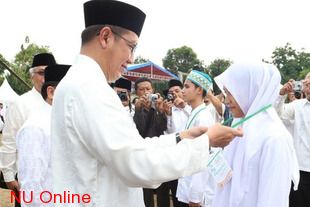Indonesian student leaders help stop radicalism in schools
NU Online · Jumat, 5 Desember 2014 | 11:03 WIB
Jakarta, NU Online
Indonesia's new government is turning to leaders of Islamic Student Associations – known as rohis – to help it prevent radicalism from taking root and spreading in schools nationwide.<>
As part of this strategy, the Ministry of Religious Affairs in mid-November hosted a four-day camp in Cibubur, East Jakarta, for 1,500 rohis from middle and high schools. The purpose was to educate these student leaders from public and Islamic schools about Islam's true teachings, and train them in how to inspire their peers to resist the temptation of extremist ideas, officials said.
"This activity is only an introduction for Muslim board members," Minister of Religious Affairs Lukman Hakim Saifuddin said. "We hope communities, schools, and homes will take this advice seriously: Monitor children and ensure they are safe from any recruitment for jihad by radicals through the internet and social media."
"Proud to be an Indonesian Muslim"
The camp's theme was "I am proud to be an Indonesian Muslim."
Apart from training the young participants to watch out for efforts by radicals to influence and recruit students, the programme taught the rohis about the importance of promoting tolerance among Indonesians.
"There are only a few intolerant students, but nothing is small when it comes to radicalism ," Amin Haidari, the ministry's director of Islamic education, told Khabar Southeast Asia. "Our ministry is concerned with the growth of radicals, and we should act accordingly."
Reaching out to student leaders in this way is crucial because some rohis may be drifting toward radicalism themselves, he said.
"In Klaten, three high school students were arrested for planning a bomb attack. We want to be sure that this will never happen in the future. One approach that we think is good is by focusing on education," Amin added.
"We can start from here – educating the board members – and, hopefully, they will spread the message to others as well."
Dims Ichsan, a rohi who participated in the camp, said he loved the experience and learned a lot.
"I've learned more about leadership, tolerance, and the importance of our roles as rohis to help counter radicalism in school," Dims, 17, told Khabar. "I think it is a big responsibility, but we can do it because we want to ensure that Islam is not tainted by wrong teachings."
Young and vulnerable
Students are susceptible to radicalism because they can be exposed to it and influenced during extracurricular activities, terrorism expert Wawan Purwanto said.
"Interactions with radicals mostly occur outside the school. The person can then transfer this ideology to other students. That is the concern," he told Khabar.
Then there is the lure of Twitter, Facebook and the internet, which radicals exploit to try to brainwash these young minds into joining their jihadist cause, Minister Lukman suggested.
"It is because their interaction is broader than it used to be, especially through social media," Lukman said of today's students.
Editing by Sudarto Murtaufiq
Terpopuler
1
KPK Tetapkan Wamenaker Immanuel Ebenezer dan 10 Orang Lain sebagai Tersangka Dugaan Pemerasan Sertifikat K3
2
LF PBNU Rilis Data Hilal Jelang Rabiul Awal 1447 H
3
Istikmal, LF PBNU: 1 Rabiul Awal 1447 Jatuh pada Senin, Maulid Nabi 5 September
4
Pacu Jalur Aura Farming: Tradisi dalam Pusaran Viralitas Media
5
KPK Beberkan Modus Pemerasan Sertifikat K3 yang Berlangsung Sejak 2019
6
IPNU-IPPNU dan PCINU Arab Saudi Dorong Tumbuhnya Tradisi Intelektual di Kalangan Pelajar
Terkini
Lihat Semua















